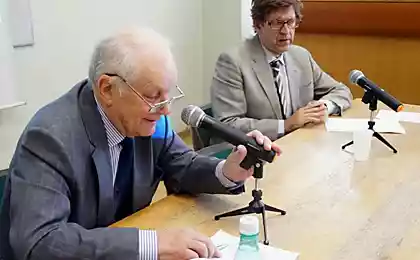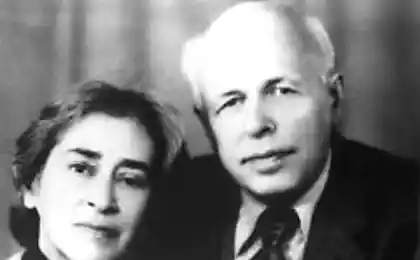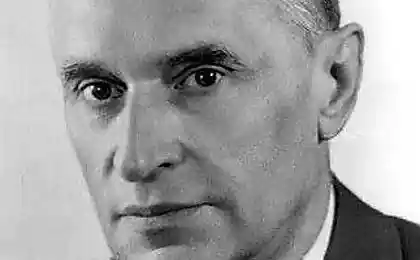1452
Sakharov: Academician's prophecies come true
Thirty years ago, academician Andrei Sakharov tried to predict the future of mankind.
Sergei Nehamkin

On May 17, 1974 Andrei Sakharov finished his article “The World in Half a Century”. It was written at the request of the American magazine "Saturday Review". The dissident opposition of the “father of the hydrogen bomb” to the Soviet system fascinated, but the question arose: what in return? In The World in Half a Century, Sakharov explained this. He did not just reflect on the prospects of scientific and technological progress, he outlined his vision of the world. “In 50 years,” he wrote, “I envision the creation of a worldwide information system (WIS) that will make available to everyone at any moment the content of any book, any article, any reference.” All barriers to the exchange of information between countries and people will disappear.” It's only been 30 years, and the World Wide Web, the Internet, exists. This prediction of Sakharov came true. And the others?
The world in half a century on the Sahara
Trouble. In 1974, “factors that will determine the appearance of the world”, Sakharov considered: population growth on the planet (by 2024 – more than 7 billion people); depletion of natural resources (oil, soil fertility, clean water, etc.); violation of the natural balance and human habitat. At the same time, he predicted a leap in scientific and technological progress. Scientific and technological progress will not bring happiness if it is not supplemented by changes in the social and moral life of mankind.
The main danger Sakharov saw in the possibility of the death of civilization in thermonuclear war. However, even avoiding a major war, humanity can die, exhausting its forces in interethnic and interstate conflicts. Among other dangers: the decline of personal and state morality, the growth of criminal tendencies, terrorism, alcoholism, drug addiction.
Exit. Economics. According to Sakharov, destructive tendencies must be countered: overcoming the disintegration of the world into opposing groups of states; the process of rapprochement (convergence) of the capitalist and socialist systems; demilitarization; protection of human rights; social progress and democratization; strengthening the personal moral principle in man. An economy of a “mixed type, combining a maximum of flexibility, freedom, social achievements and opportunities for global regulation” is the optimal system, according to Sakharov.
Exit. Politics. The role of international organizations – the UN, UNESCO and others – in which I would like to see the beginning of a world government, alien to any goals other than universal ones, should be very great. A number of steps are needed to achieve this goal: assistance to developing countries, the creation of “international advisory bodies that monitor human rights in each country”; the admission of organizations such as the Red Cross, the World Health Organization, Amnesty International to places where human rights violations can be suspected (detention facilities and “mental prisons”); a “democratic solution to the problem of freedom of movement” – emigration, re-emigration, personal travel (this, according to Sakharov, is one of the first and most important conditions). The basis of the work of all international organizations should be the Universal Declaration of Human Rights.
Forecasts
ZT and RT. Sakharov believed that in 2024, the formation of two types of territories – the “working territory” (RT) and the “reserve territory” (ZT) will be in full swing. Intensive agriculture is being carried on in the “working area” (smaller in area and with a much greater density of population), nature is completely transformed for industrial needs, all industry is concentrated with giant automatic and semi-automatic plants. The reserve area is a place where people recuperate. They work with their hands and their heads, read books, think. They live in tents or houses built like the homes of their ancestors. They hear the noise of a mountain stream or simply enjoy the silence, beauty of wildlife, forests, sky and clouds.”
Earthly cities. According to Sakharov, most of the world's population will live in megacities located in the RT. "In their central part - multi-storey houses-mountains (...) with an artificial climate, lighting, automated kitchens, holographic walls-landscapes." Most of the territory of the cities-2024 will be occupied by “suburbs stretching for tens of kilometers (...) – with cottages, gardens, gardens, children’s institutions, sports grounds, swimming pools (...), with silent and convenient public transport, with clean air.”
Flying and underground cities. A natural extension of RT along Sakharov will be “flying cities” – artificial satellites of the Earth, performing important production functions. “They are concentrated solar energy, perhaps a significant part of nuclear and thermonuclear installations with radiant cooling of energy refrigerators (...); these are enterprises of vacuum metallurgy, greenhouse economy, etc.; these are space scientific laboratories.” Another direction is the creation of “underground cities for sleep, entertainment, maintenance of underground transport and mining”.
Agriculture. Sakharov believed that agriculture of the future is artificial superproductive soil; abundant irrigation; in the northern regions - the development of greenhouse farming using illumination, soil heating, electrophoresis and other methods of influence. In addition, there is a “green revolution”, provided by the achievements of genetics and selection. New forms of agriculture – marine, bacterial, microalgae, mushroom, etc. Perhaps agriculture in Antarctica and other planets.
Industry. Enterprises with a closed cycle, without harmful and clogging waste. Automation, flexibility and adjustment of production. “Ideally, one can think about overcoming the socially harmful (...) phenomena of artificial stimulation of ‘super demand’ that are now taking place in developed countries.”
Communications and information services. In the future, perhaps later than 50 years, I envisage the creation of a world information system (WIS), which will make available to everyone at any moment the content of any book, any article, any reference. But the truly historic role of the VIS will be to remove all barriers to information exchange between countries and people.”
Energy. “For 50 years, coal-fired energy will continue to be important, with the total absorption of harmful waste.” At the same time - the development of nuclear energy, by the end of this period - thermonuclear energy.
Transport. “The car will be replaced by a rechargeable cart on walking legs that do not violate the grass cover and do not require asphalt roads.” For the main cargo and passenger transportation, helium airships with a nuclear engine and high-speed trains with a nuclear engine on overpasses and in tunnels.”
Scientific advances. In 1974, Sakharov predicted that 50 years from now, scientists would finally be able to model theoretically through “computing machines with large amounts of memory and speed.” Examples of tasks that can be solved thanks to the development of computer technology: “weather forecast (...) calculations of organic molecules, elementary biophysical processes, calculations of “multidimensional” production processes, for example, in metallurgy and the chemical industry, complex economic and sociological calculations.” . . ?
"Revolutionary" discoveries. “Progress may be made in the synthesis of substances with superconductivity at room temperature. Such a discovery would mean a revolution in many fields of technology. For example, in transport (superconducting rails on which the wagon slides without friction on a magnetic “cushion”.)
Invention of new materials. In the devices of the future, economical and easily controlled artificial “muscles” from polymers with the property of contractibility will be used (...) highly sensitive analyzers of organic and inorganic impurities in air and water will be created, working on the principle of an artificial “nose”, etc.
Space. For Sakharov, space research is one of the main directions of scientific research. “I suggest an expansion of attempts to establish communication with alien civilizations. (...) Inaction in this direction, despite the absence of any guarantees of success, would be unwise. It is likely that economic development of the lunar surface will begin by the end of the fiftieth anniversary.”
Thirty years later: it came true, it did not come true, it will come true tomorrow
At the request of Izvestia, Sakharov’s forecasts are commented by Doctor of Physical and Mathematical Sciences, Head of the Department of the Institute of the History of Natural Science and Technology of the Russian Academy of Sciences Grigory Idlis.
ZT, RT and Earth cities. To work in a metropolis, and to have a house in a quiet place in nature - so strive to live today's wealthy people. I think the trend will continue. And tomorrow’s metropolis is roughly what Sakharov wrote about: a city plus giant suburbs. Here is another problem: with the development of civilization, the "working territory" will inevitably expand - and it is clear that at the expense of the "reserve".
Flying and underground cities. Will they appear in 20 years? Hardly. The “working territory” of the Earth is more likely to be expanded by artificial islands in the ocean (the path the Japanese follow).
Agriculture. The Green Revolution? Absolutely. New types of farming? Maybe. Farm development of the North and Antarctica - no. Why? A more promising path is the development of deserts. But this will require solving the problem of seawater desalination.
Industry. It develops according to Sakharov – closed cycles, automation. There's no other way. Overcoming "super demand"? The most important task, but not so much the production-economic, as social, philosophical. It is necessary to solve it, otherwise no technology will save, civilization will drive itself into a dead end.
Communications and information services. The Internet came along. One hundred percent hit!
Energy. It's harder. The importance of “traditional” energy will remain for a long time, although the reserves of coal, oil and gas are certainly declining. Nuclear power? The problem of nuclear waste is unlikely to be solved by 2020. Thermonuclear? 30 years ago, it seemed like it was about to happen. But so far it's been unsuccessful. Maybe in 20 years, the first real achievements. I think solar and wind energy will develop more intensively.
Transport. “Carts on feet”, of course, for a long time the wheel will not displace. High-speed trains are already a reality. They won’t need a nuclear engine: “synthesis of superconducting substances” at normal temperatures is quite real. Airships? It's a good idea, but it's not in demand. It is difficult to say whether tomorrow will be needed.
Scientific advances. Sakharov’s forecasts for the development of electronic computing technology are more than blocked. Here we are waiting for much greater progress - up to the creation of artificial intelligence.
Invention of new materials. Artificial “muscles”, artificial nose – well, it is quite possible. Everything created by nature, sooner or later can be repeated and improved.
Space. Of course, Sakharov is right. And the search for extraterrestrial civilizations will necessarily lead as a passing goal in solving other problems. And economic development The moon is real in 20 years. Not in the sense of planting potatoes there, but to create, for example, an intermediate station for flights to other planets.
Perestroika, Global Warming, September 11
And one more thing that Andrei Sakharov did not guess.
In "The World in Half a Century," there is no word about:
the possibility of perestroika in the USSR (started 12 years later); the collapse of the communist system; the collapse of the USSR into independent states; the collapse of the “Eastern bloc” (though, perhaps, the context of the article suggests that in one form or another all this has already happened);
The problems that freedom of movement around the world will create (Muslims in France, etc.)
- the probability of a civilizational fault that gave rise to the current "hot spots" (Yugoslavia, the Middle East, Chechnya);
Global warming and the threat of climate change on entire continents.
physicist Sakharov then did not foresee the danger of the Chernobyl-type accident.
We invite the reader to continue the list.
Roy Medvedev, historian: “It is impossible to calculate the future”
The energy crisis of the early 1970s forced Western intellectuals to put forward the thesis that the world is finite in time. This is reflected in the predictions of the Club of Rome (an informal association of scientists). Based on the data and methods of the time, they calculated what would happen if the trends of the 70s continued. The picture came out apocalyptic: after so many years, oil, gas, coal will run out, an environmental catastrophe will begin. We have to do something. The political situation did not add optimism: the “cold war”, the “third world” increasingly asserted itself, in China – Mao. There was a public demand for forecasts, and, as is customary in times of mass despondency, optimistic predictions were not in demand.
The Soviet Union did not suffer back then; on the contrary, we even benefited by being able to sell oil to the West. However, the echoes of European sentiment have reached us. I have then arguments on this subject of our scientists - Ambartsumov, Bestuzhev - Lady - a whole collection. Sakharov’s forecast is from the same series, simply because of the uniqueness of Andrei Dmitrievich’s personality, it acquired a special sound. By the way, a little earlier appeared the famous “Letter to the leaders of the Soviet Union” Solzhenitsyn. Also relying on the conclusions of the Club of Rome and considering the war with China real, he proposed to abandon communist ideology, urgently develop the northeast of the USSR and gradually move the country there. The fact that two such large personalities were almost simultaneously and independently concerned with similar problems is indicative.
How do you assess Sakharov’s forecasts today?
Let’s start with what seemed the most dangerous. Environmental problems are acute, but, oddly enough, humanity has adapted to them. I think global catastrophe is still far away. In general, when the crisis settled ten years later, the members of the Club of Rome themselves began to admit that much was not taken into account.
In my opinion, it is too early to talk about the depletion of natural reserves – new deposits are being discovered, new technologies are emerging. The theoretical danger of thermonuclear war remains, but no one really expects it. Small wars go on incessantly, but they do not cause a global crisis. Has the war in Iraq affected your life?
The economic system in a number of Western European countries can be considered an example of convergence: on the one hand, the market, on the other, a set of social guarantees. But the social successes of Europe are the result of the activities of the socialist governments of specific states. Somewhere these successes are more, somewhere less. In the USSR, the West seemed to be one thing. Today it is clear that Sweden is not like the United States, England is not like Japan.
World government is still a long way off. Of course, European countries have come together – it is easier to resist pressure and defend our interests. But I would rather talk about a forced-defensive impulse than a voluntary-unification one.
And the idea of a world government? It is not only Sakharov put forward, but also other major scientists, Einstein, for example.
- You see, any forecast carries the imprint of the personality making this prediction. Sakharov, Einstein are wonderful physicists. They lived in a world of intelligent, benevolent intellectuals, in a world where national and religious differences are not significant, where a Russian scientist can easily understand an American or a Chinese one, where everyone deserved approximately the same material level of intelligence and talent. Think of the Academic Townships! So the thought was, if our environment was able to organize this way, why not offer this model to the rest of us? What separates people – boundaries, faith, origin – is so irrational. The optimism of technocrats is in a good way. Solzhenitsyn is another story. Young was in an environment aggressive to him: war, camp, exile, illness, underground writing. Formed such a "protopop Avvakum" - strong, uncompromising. He also offered the “Old Believer” exit: let’s go to the skits!
Well, I'm all about others. In the 80th year, it seems, at the request of an Austrian magazine, he tried to predict the future of the USSR. I guessed nothing! And this is natural – I am a socialist in my convictions – I could not have foreseen the path the country had taken in a terrible dream.
- It's an interesting thing. Society is waiting for forecasts because it is always interesting. Politicians are waiting for forecasts because they need to know what to expect tomorrow. The smartest people of their time make predictions and miss them!
It is impossible to predict the future in advance. 90% of the factors that determine the development of history are spontaneous, unmanageable. You can calculate a separate trend for tomorrow - and the day after tomorrow everything will be very different. The Germans were so eager for German reunification – who could have said that it would result in unemployment, severe social problems? There are three options for the war in Iraq: good, bad and very bad. We are witnessing the development of a fourth, which has not been considered, it may turn out to be worse than the worst. I once had an accurate forecast: I said that Brezhnev would replace Andropov. I remember that. Years passed, my dissidence was over, I was already a People’s Deputy of the USSR, and the Americans once asked: “Mr. Medvedev, suppose something happens to Gorbachev.” Who will replace him? I honestly don't know. What do you think? You see, Mr. Medvedev, we put information on all the politicians of the USSR into the computer. The computer gave the result: Vadim Bakatin. From the point of view of the computer, everything is logical: young, handsome, was a party worker, headed the KGB, while a democrat.
Elena Bonner, widow of academician Sakharov: Half a century has not passed. And I believe in Andrew's intuition.
I remember writing “The World in Half a Century.” There was an unexpected request from the “Sutterday Review” – to write a futurological article for the anniversary of the magazine. Andriusha immediately lit up: “I want to give myself freedom!” I meant to fantasize. There was no will at home - a dissident turnover (from which you get pretty tired), family turnover, there was night for work. We decided to go "savage" somewhere south. Lived in Sukhumi, then in Sochi. May, the sun, the sea, a sense of liberation from affairs and worries. Andrew wrote, I typed. I liked the article with its simplicity and imagination. Andrey writes in his diaries that I often got into his work with my ideas – here I “poked” only once: when he talks about the “World Information System” (WIS). There was something like this phrase: the VIS will make books and museums “not necessary”. Life without books and pictures is terrifying! After the argument, they agreed that the books will be preserved forever.
This article does not mention many of the most acute problems that were already obvious then, and in our time have become paramount. Terrorism, for example...
But it is impossible to consider “The World in Half a Century” in isolation from other Sakharov’s works! He wrote all the time about terrorism, about extremism, about the inevitability of changes in our country. I just decided not to repeat myself here, to focus on other things.
Imagine: today you are reading “The World in Half a Century” with Andrei Dmitrievich. Bet - here justified, there is no...
- I don't know. Here’s a story about artificial satellites becoming flying cities. Of course, it is too early to talk about this. But rovers are already driving on Mars, space is becoming commonplace, and it will reach satellite cities. The division of the Earth into “working” and “reserve” zones. Probably a long way off, too. But how amazingly fulfilled the prediction with the VIS! Every time I log on to the Internet and receive the necessary help in a matter of minutes, when I send an email and immediately receive a response, I remember Andriusha.
– However, you will agree, “carriage on walking legs to save grass cover” – sounds naive.
You know, talking about Sakharov’s naivety didn’t bother me during his lifetime. This will come true! I believe in Andrew's intuition. All our feelings can be good or evil, and so can intuition. Andrey had a good intuition. He anticipated that one day the task would be to create a vehicle that preserves the surface of the earth. And it will be created. And on "legs" or not on "legs" - the tenth thing.
s***
In 2003, according to advertising, in Honduras it was supposed to complete the construction of a floating city ship (actually - a state ship) "Freedom Ship". The project was striking in scale: a ship with a displacement of 2.7 million tons; 25 decks a kilometer by 300 meters; all imaginable means of communication; protection from natural disasters; water regeneration and waste treatment system; incredible comfort. The number of passengers (residents?) – up to 75 thousand people, another 25 thousand – the team and service personnel. The idea: the ship plows the oceans, it is home to very rich people who register their tax-free companies, continuing to do business on board. There was no more news on this topic, but it is characteristic that the technological project is considered quite achievable, so we may hear about something similar. “Floating cities” are not the “flying” that Sakharov dreamed of, but...
Sergei Nehamkin

On May 17, 1974 Andrei Sakharov finished his article “The World in Half a Century”. It was written at the request of the American magazine "Saturday Review". The dissident opposition of the “father of the hydrogen bomb” to the Soviet system fascinated, but the question arose: what in return? In The World in Half a Century, Sakharov explained this. He did not just reflect on the prospects of scientific and technological progress, he outlined his vision of the world. “In 50 years,” he wrote, “I envision the creation of a worldwide information system (WIS) that will make available to everyone at any moment the content of any book, any article, any reference.” All barriers to the exchange of information between countries and people will disappear.” It's only been 30 years, and the World Wide Web, the Internet, exists. This prediction of Sakharov came true. And the others?
The world in half a century on the Sahara
Trouble. In 1974, “factors that will determine the appearance of the world”, Sakharov considered: population growth on the planet (by 2024 – more than 7 billion people); depletion of natural resources (oil, soil fertility, clean water, etc.); violation of the natural balance and human habitat. At the same time, he predicted a leap in scientific and technological progress. Scientific and technological progress will not bring happiness if it is not supplemented by changes in the social and moral life of mankind.
The main danger Sakharov saw in the possibility of the death of civilization in thermonuclear war. However, even avoiding a major war, humanity can die, exhausting its forces in interethnic and interstate conflicts. Among other dangers: the decline of personal and state morality, the growth of criminal tendencies, terrorism, alcoholism, drug addiction.
Exit. Economics. According to Sakharov, destructive tendencies must be countered: overcoming the disintegration of the world into opposing groups of states; the process of rapprochement (convergence) of the capitalist and socialist systems; demilitarization; protection of human rights; social progress and democratization; strengthening the personal moral principle in man. An economy of a “mixed type, combining a maximum of flexibility, freedom, social achievements and opportunities for global regulation” is the optimal system, according to Sakharov.
Exit. Politics. The role of international organizations – the UN, UNESCO and others – in which I would like to see the beginning of a world government, alien to any goals other than universal ones, should be very great. A number of steps are needed to achieve this goal: assistance to developing countries, the creation of “international advisory bodies that monitor human rights in each country”; the admission of organizations such as the Red Cross, the World Health Organization, Amnesty International to places where human rights violations can be suspected (detention facilities and “mental prisons”); a “democratic solution to the problem of freedom of movement” – emigration, re-emigration, personal travel (this, according to Sakharov, is one of the first and most important conditions). The basis of the work of all international organizations should be the Universal Declaration of Human Rights.
Forecasts
ZT and RT. Sakharov believed that in 2024, the formation of two types of territories – the “working territory” (RT) and the “reserve territory” (ZT) will be in full swing. Intensive agriculture is being carried on in the “working area” (smaller in area and with a much greater density of population), nature is completely transformed for industrial needs, all industry is concentrated with giant automatic and semi-automatic plants. The reserve area is a place where people recuperate. They work with their hands and their heads, read books, think. They live in tents or houses built like the homes of their ancestors. They hear the noise of a mountain stream or simply enjoy the silence, beauty of wildlife, forests, sky and clouds.”
Earthly cities. According to Sakharov, most of the world's population will live in megacities located in the RT. "In their central part - multi-storey houses-mountains (...) with an artificial climate, lighting, automated kitchens, holographic walls-landscapes." Most of the territory of the cities-2024 will be occupied by “suburbs stretching for tens of kilometers (...) – with cottages, gardens, gardens, children’s institutions, sports grounds, swimming pools (...), with silent and convenient public transport, with clean air.”
Flying and underground cities. A natural extension of RT along Sakharov will be “flying cities” – artificial satellites of the Earth, performing important production functions. “They are concentrated solar energy, perhaps a significant part of nuclear and thermonuclear installations with radiant cooling of energy refrigerators (...); these are enterprises of vacuum metallurgy, greenhouse economy, etc.; these are space scientific laboratories.” Another direction is the creation of “underground cities for sleep, entertainment, maintenance of underground transport and mining”.
Agriculture. Sakharov believed that agriculture of the future is artificial superproductive soil; abundant irrigation; in the northern regions - the development of greenhouse farming using illumination, soil heating, electrophoresis and other methods of influence. In addition, there is a “green revolution”, provided by the achievements of genetics and selection. New forms of agriculture – marine, bacterial, microalgae, mushroom, etc. Perhaps agriculture in Antarctica and other planets.
Industry. Enterprises with a closed cycle, without harmful and clogging waste. Automation, flexibility and adjustment of production. “Ideally, one can think about overcoming the socially harmful (...) phenomena of artificial stimulation of ‘super demand’ that are now taking place in developed countries.”
Communications and information services. In the future, perhaps later than 50 years, I envisage the creation of a world information system (WIS), which will make available to everyone at any moment the content of any book, any article, any reference. But the truly historic role of the VIS will be to remove all barriers to information exchange between countries and people.”
Energy. “For 50 years, coal-fired energy will continue to be important, with the total absorption of harmful waste.” At the same time - the development of nuclear energy, by the end of this period - thermonuclear energy.
Transport. “The car will be replaced by a rechargeable cart on walking legs that do not violate the grass cover and do not require asphalt roads.” For the main cargo and passenger transportation, helium airships with a nuclear engine and high-speed trains with a nuclear engine on overpasses and in tunnels.”
Scientific advances. In 1974, Sakharov predicted that 50 years from now, scientists would finally be able to model theoretically through “computing machines with large amounts of memory and speed.” Examples of tasks that can be solved thanks to the development of computer technology: “weather forecast (...) calculations of organic molecules, elementary biophysical processes, calculations of “multidimensional” production processes, for example, in metallurgy and the chemical industry, complex economic and sociological calculations.” . . ?
"Revolutionary" discoveries. “Progress may be made in the synthesis of substances with superconductivity at room temperature. Such a discovery would mean a revolution in many fields of technology. For example, in transport (superconducting rails on which the wagon slides without friction on a magnetic “cushion”.)
Invention of new materials. In the devices of the future, economical and easily controlled artificial “muscles” from polymers with the property of contractibility will be used (...) highly sensitive analyzers of organic and inorganic impurities in air and water will be created, working on the principle of an artificial “nose”, etc.
Space. For Sakharov, space research is one of the main directions of scientific research. “I suggest an expansion of attempts to establish communication with alien civilizations. (...) Inaction in this direction, despite the absence of any guarantees of success, would be unwise. It is likely that economic development of the lunar surface will begin by the end of the fiftieth anniversary.”
Thirty years later: it came true, it did not come true, it will come true tomorrow
At the request of Izvestia, Sakharov’s forecasts are commented by Doctor of Physical and Mathematical Sciences, Head of the Department of the Institute of the History of Natural Science and Technology of the Russian Academy of Sciences Grigory Idlis.
ZT, RT and Earth cities. To work in a metropolis, and to have a house in a quiet place in nature - so strive to live today's wealthy people. I think the trend will continue. And tomorrow’s metropolis is roughly what Sakharov wrote about: a city plus giant suburbs. Here is another problem: with the development of civilization, the "working territory" will inevitably expand - and it is clear that at the expense of the "reserve".
Flying and underground cities. Will they appear in 20 years? Hardly. The “working territory” of the Earth is more likely to be expanded by artificial islands in the ocean (the path the Japanese follow).
Agriculture. The Green Revolution? Absolutely. New types of farming? Maybe. Farm development of the North and Antarctica - no. Why? A more promising path is the development of deserts. But this will require solving the problem of seawater desalination.
Industry. It develops according to Sakharov – closed cycles, automation. There's no other way. Overcoming "super demand"? The most important task, but not so much the production-economic, as social, philosophical. It is necessary to solve it, otherwise no technology will save, civilization will drive itself into a dead end.
Communications and information services. The Internet came along. One hundred percent hit!
Energy. It's harder. The importance of “traditional” energy will remain for a long time, although the reserves of coal, oil and gas are certainly declining. Nuclear power? The problem of nuclear waste is unlikely to be solved by 2020. Thermonuclear? 30 years ago, it seemed like it was about to happen. But so far it's been unsuccessful. Maybe in 20 years, the first real achievements. I think solar and wind energy will develop more intensively.
Transport. “Carts on feet”, of course, for a long time the wheel will not displace. High-speed trains are already a reality. They won’t need a nuclear engine: “synthesis of superconducting substances” at normal temperatures is quite real. Airships? It's a good idea, but it's not in demand. It is difficult to say whether tomorrow will be needed.
Scientific advances. Sakharov’s forecasts for the development of electronic computing technology are more than blocked. Here we are waiting for much greater progress - up to the creation of artificial intelligence.
Invention of new materials. Artificial “muscles”, artificial nose – well, it is quite possible. Everything created by nature, sooner or later can be repeated and improved.
Space. Of course, Sakharov is right. And the search for extraterrestrial civilizations will necessarily lead as a passing goal in solving other problems. And economic development The moon is real in 20 years. Not in the sense of planting potatoes there, but to create, for example, an intermediate station for flights to other planets.
Perestroika, Global Warming, September 11
And one more thing that Andrei Sakharov did not guess.
In "The World in Half a Century," there is no word about:
the possibility of perestroika in the USSR (started 12 years later); the collapse of the communist system; the collapse of the USSR into independent states; the collapse of the “Eastern bloc” (though, perhaps, the context of the article suggests that in one form or another all this has already happened);
The problems that freedom of movement around the world will create (Muslims in France, etc.)
- the probability of a civilizational fault that gave rise to the current "hot spots" (Yugoslavia, the Middle East, Chechnya);
Global warming and the threat of climate change on entire continents.
physicist Sakharov then did not foresee the danger of the Chernobyl-type accident.
We invite the reader to continue the list.
Roy Medvedev, historian: “It is impossible to calculate the future”
The energy crisis of the early 1970s forced Western intellectuals to put forward the thesis that the world is finite in time. This is reflected in the predictions of the Club of Rome (an informal association of scientists). Based on the data and methods of the time, they calculated what would happen if the trends of the 70s continued. The picture came out apocalyptic: after so many years, oil, gas, coal will run out, an environmental catastrophe will begin. We have to do something. The political situation did not add optimism: the “cold war”, the “third world” increasingly asserted itself, in China – Mao. There was a public demand for forecasts, and, as is customary in times of mass despondency, optimistic predictions were not in demand.
The Soviet Union did not suffer back then; on the contrary, we even benefited by being able to sell oil to the West. However, the echoes of European sentiment have reached us. I have then arguments on this subject of our scientists - Ambartsumov, Bestuzhev - Lady - a whole collection. Sakharov’s forecast is from the same series, simply because of the uniqueness of Andrei Dmitrievich’s personality, it acquired a special sound. By the way, a little earlier appeared the famous “Letter to the leaders of the Soviet Union” Solzhenitsyn. Also relying on the conclusions of the Club of Rome and considering the war with China real, he proposed to abandon communist ideology, urgently develop the northeast of the USSR and gradually move the country there. The fact that two such large personalities were almost simultaneously and independently concerned with similar problems is indicative.
How do you assess Sakharov’s forecasts today?
Let’s start with what seemed the most dangerous. Environmental problems are acute, but, oddly enough, humanity has adapted to them. I think global catastrophe is still far away. In general, when the crisis settled ten years later, the members of the Club of Rome themselves began to admit that much was not taken into account.
In my opinion, it is too early to talk about the depletion of natural reserves – new deposits are being discovered, new technologies are emerging. The theoretical danger of thermonuclear war remains, but no one really expects it. Small wars go on incessantly, but they do not cause a global crisis. Has the war in Iraq affected your life?
The economic system in a number of Western European countries can be considered an example of convergence: on the one hand, the market, on the other, a set of social guarantees. But the social successes of Europe are the result of the activities of the socialist governments of specific states. Somewhere these successes are more, somewhere less. In the USSR, the West seemed to be one thing. Today it is clear that Sweden is not like the United States, England is not like Japan.
World government is still a long way off. Of course, European countries have come together – it is easier to resist pressure and defend our interests. But I would rather talk about a forced-defensive impulse than a voluntary-unification one.
And the idea of a world government? It is not only Sakharov put forward, but also other major scientists, Einstein, for example.
- You see, any forecast carries the imprint of the personality making this prediction. Sakharov, Einstein are wonderful physicists. They lived in a world of intelligent, benevolent intellectuals, in a world where national and religious differences are not significant, where a Russian scientist can easily understand an American or a Chinese one, where everyone deserved approximately the same material level of intelligence and talent. Think of the Academic Townships! So the thought was, if our environment was able to organize this way, why not offer this model to the rest of us? What separates people – boundaries, faith, origin – is so irrational. The optimism of technocrats is in a good way. Solzhenitsyn is another story. Young was in an environment aggressive to him: war, camp, exile, illness, underground writing. Formed such a "protopop Avvakum" - strong, uncompromising. He also offered the “Old Believer” exit: let’s go to the skits!
Well, I'm all about others. In the 80th year, it seems, at the request of an Austrian magazine, he tried to predict the future of the USSR. I guessed nothing! And this is natural – I am a socialist in my convictions – I could not have foreseen the path the country had taken in a terrible dream.
- It's an interesting thing. Society is waiting for forecasts because it is always interesting. Politicians are waiting for forecasts because they need to know what to expect tomorrow. The smartest people of their time make predictions and miss them!
It is impossible to predict the future in advance. 90% of the factors that determine the development of history are spontaneous, unmanageable. You can calculate a separate trend for tomorrow - and the day after tomorrow everything will be very different. The Germans were so eager for German reunification – who could have said that it would result in unemployment, severe social problems? There are three options for the war in Iraq: good, bad and very bad. We are witnessing the development of a fourth, which has not been considered, it may turn out to be worse than the worst. I once had an accurate forecast: I said that Brezhnev would replace Andropov. I remember that. Years passed, my dissidence was over, I was already a People’s Deputy of the USSR, and the Americans once asked: “Mr. Medvedev, suppose something happens to Gorbachev.” Who will replace him? I honestly don't know. What do you think? You see, Mr. Medvedev, we put information on all the politicians of the USSR into the computer. The computer gave the result: Vadim Bakatin. From the point of view of the computer, everything is logical: young, handsome, was a party worker, headed the KGB, while a democrat.
Elena Bonner, widow of academician Sakharov: Half a century has not passed. And I believe in Andrew's intuition.
I remember writing “The World in Half a Century.” There was an unexpected request from the “Sutterday Review” – to write a futurological article for the anniversary of the magazine. Andriusha immediately lit up: “I want to give myself freedom!” I meant to fantasize. There was no will at home - a dissident turnover (from which you get pretty tired), family turnover, there was night for work. We decided to go "savage" somewhere south. Lived in Sukhumi, then in Sochi. May, the sun, the sea, a sense of liberation from affairs and worries. Andrew wrote, I typed. I liked the article with its simplicity and imagination. Andrey writes in his diaries that I often got into his work with my ideas – here I “poked” only once: when he talks about the “World Information System” (WIS). There was something like this phrase: the VIS will make books and museums “not necessary”. Life without books and pictures is terrifying! After the argument, they agreed that the books will be preserved forever.
This article does not mention many of the most acute problems that were already obvious then, and in our time have become paramount. Terrorism, for example...
But it is impossible to consider “The World in Half a Century” in isolation from other Sakharov’s works! He wrote all the time about terrorism, about extremism, about the inevitability of changes in our country. I just decided not to repeat myself here, to focus on other things.
Imagine: today you are reading “The World in Half a Century” with Andrei Dmitrievich. Bet - here justified, there is no...
- I don't know. Here’s a story about artificial satellites becoming flying cities. Of course, it is too early to talk about this. But rovers are already driving on Mars, space is becoming commonplace, and it will reach satellite cities. The division of the Earth into “working” and “reserve” zones. Probably a long way off, too. But how amazingly fulfilled the prediction with the VIS! Every time I log on to the Internet and receive the necessary help in a matter of minutes, when I send an email and immediately receive a response, I remember Andriusha.
– However, you will agree, “carriage on walking legs to save grass cover” – sounds naive.
You know, talking about Sakharov’s naivety didn’t bother me during his lifetime. This will come true! I believe in Andrew's intuition. All our feelings can be good or evil, and so can intuition. Andrey had a good intuition. He anticipated that one day the task would be to create a vehicle that preserves the surface of the earth. And it will be created. And on "legs" or not on "legs" - the tenth thing.
s***
In 2003, according to advertising, in Honduras it was supposed to complete the construction of a floating city ship (actually - a state ship) "Freedom Ship". The project was striking in scale: a ship with a displacement of 2.7 million tons; 25 decks a kilometer by 300 meters; all imaginable means of communication; protection from natural disasters; water regeneration and waste treatment system; incredible comfort. The number of passengers (residents?) – up to 75 thousand people, another 25 thousand – the team and service personnel. The idea: the ship plows the oceans, it is home to very rich people who register their tax-free companies, continuing to do business on board. There was no more news on this topic, but it is characteristic that the technological project is considered quite achievable, so we may hear about something similar. “Floating cities” are not the “flying” that Sakharov dreamed of, but...























